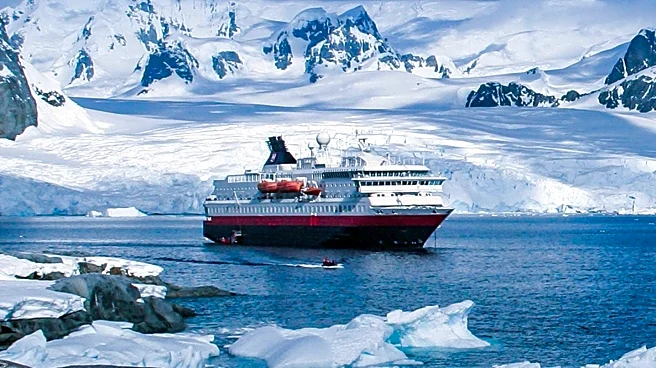What's Happening?
Seabourn has announced its expedition team for the upcoming 2025-26 Antarctica season, featuring voyages aboard the Seabourn Venture and Seabourn Pursuit. The team consists of 23 experts, including ornithologists,
marine biologists, historians, oceanographers, and geologists, who will guide guests through immersive experiences in Antarctica. These specialists are renowned for their exploration passion and deep knowledge of the natural world, transforming each moment on board and ashore into a rich learning journey. The expeditions will include Zodiac landings, lectures, wildlife encounters, and submarine excursions, aiming to deepen guests' connection with the continent.
Why It's Important?
The unveiling of Seabourn's expedition team highlights the growing trend of luxury adventure travel, combining high-end amenities with educational and immersive experiences. This approach caters to travelers seeking unique and meaningful journeys, potentially boosting tourism in remote regions like Antarctica. The involvement of experts ensures that guests receive in-depth knowledge and insights, enhancing the value of the travel experience. Such initiatives can drive economic benefits for the travel industry, particularly in niche markets focused on exploration and environmental awareness.
What's Next?
Seabourn's expeditions are set to commence in the 2025-26 season, with the team preparing to deliver a comprehensive exploration experience. As the season approaches, Seabourn may continue to refine its offerings, potentially expanding its expedition team or introducing new activities to enhance guest engagement. The travel industry will likely monitor the success of these expeditions, considering similar models for other remote destinations. Stakeholders may also focus on sustainability practices, ensuring that increased tourism does not adversely impact the fragile Antarctic environment.
Beyond the Headlines
The emphasis on expert-led expeditions reflects a broader shift towards experiential travel, where guests seek deeper connections with destinations. This trend may influence travel companies to invest in educational and conservation-focused initiatives, aligning with growing consumer interest in responsible tourism. Additionally, the presence of experts in fields like marine biology and geology underscores the importance of scientific research in understanding and preserving natural environments, potentially fostering collaborations between travel companies and research institutions.









